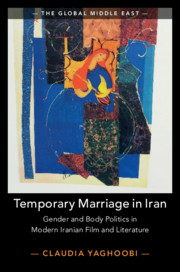2 results
Introduction
- from Part I - General Overview
-
- Book:
- Temporary Marriage in Iran
- Published online:
- 13 January 2020
- Print publication:
- 30 January 2020, pp 9-44
-
- Chapter
-
- You have access
- HTML
- Export citation

Temporary Marriage in Iran
- Gender and Body Politics in Modern Iranian Film and Literature
-
- Published online:
- 13 January 2020
- Print publication:
- 30 January 2020

